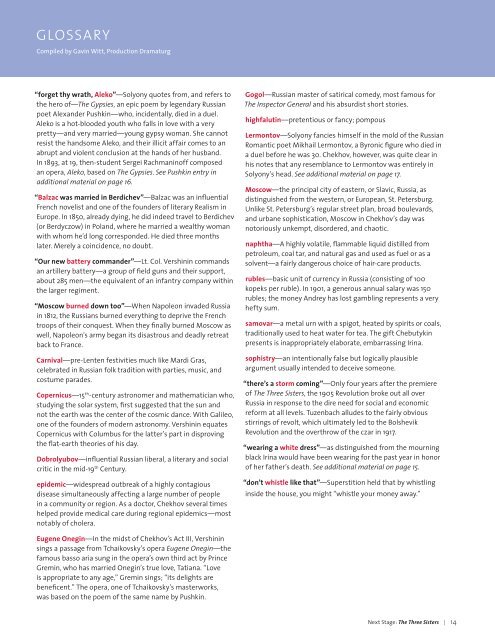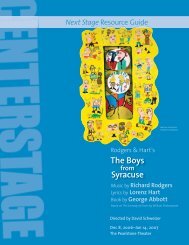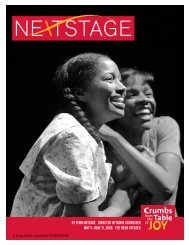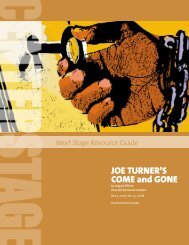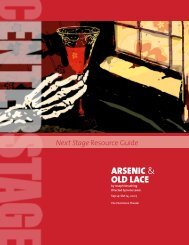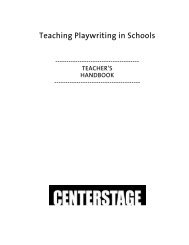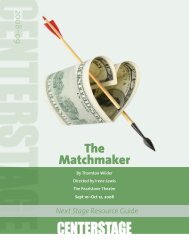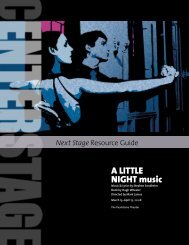You also want an ePaper? Increase the reach of your titles
YUMPU automatically turns print PDFs into web optimized ePapers that Google loves.
Glossary<br />
Compiled by Gavin Witt, Production Dramaturg<br />
“forget thy wrath, Aleko”—Solyony quotes from, and refers to<br />
the hero of—The Gypsies, an epic poem by legendary Russian<br />
poet Alexander Pushkin—who, incidentally, died in a duel.<br />
Aleko is a hot-blooded youth who falls in love with a very<br />
pretty—and very married—young gypsy woman. She cannot<br />
resist the handsome Aleko, and their illicit affair comes to an<br />
abrupt and violent conclusion at the hands of her husband.<br />
In 1893, at 19, then-student Sergei Rachmaninoff composed<br />
an opera, Aleko, based on The Gypsies. See Pushkin entry in<br />
additional material on page 16.<br />
“Balzac was married in Berdichev”—Balzac was an influential<br />
French novelist and one of the founders of literary Realism in<br />
Europe. In 1850, already dying, he did indeed travel to Berdichev<br />
(or Berdyczow) in Poland, where he married a wealthy woman<br />
with whom he’d long corresponded. He died three months<br />
later. Merely a coincidence, no doubt.<br />
“Our new battery commander”—Lt. Col. Vershinin commands<br />
an artillery battery—a group of field guns and their support,<br />
about 285 men—the equivalent of an infantry company within<br />
the larger regiment.<br />
“Moscow burned down too”—When Napoleon invaded Russia<br />
in 1812, the Russians burned everything to deprive the French<br />
troops of their conquest. When they finally burned Moscow as<br />
well, Napoleon’s army began its disastrous and deadly retreat<br />
back to France.<br />
Carnival—pre-Lenten festivities much like Mardi Gras,<br />
celebrated in Russian folk tradition with parties, music, and<br />
costume parades.<br />
Copernicus—15 th -century astronomer and mathematician who,<br />
studying the solar system, first suggested that the sun and<br />
not the earth was the center of the cosmic dance. With Galileo,<br />
one of the founders of modern astronomy. Vershinin equates<br />
Copernicus with Columbus for the latter’s part in disproving<br />
the flat-earth theories of his day.<br />
Dobrolyubov—influential Russian liberal, a literary and social<br />
critic in the mid-19 th Century.<br />
epidemic—widespread outbreak of a highly contagious<br />
disease simultaneously affecting a large number of people<br />
in a community or region. As a doctor, <strong>Chekhov</strong> several times<br />
helped provide medical care during regional epidemics—most<br />
notably of cholera.<br />
Gogol—Russian master of satirical comedy, most famous for<br />
The Inspector General and his absurdist short stories.<br />
highfalutin—pretentious or fancy; pompous<br />
Lermontov—Solyony fancies himself in the mold of the Russian<br />
Romantic poet Mikhail Lermontov, a <strong>By</strong>ronic figure who died in<br />
a duel before he was 30. <strong>Chekhov</strong>, however, was quite clear in<br />
his notes that any resemblance to Lermontov was entirely in<br />
Solyony’s head. See additional material on page 17.<br />
Moscow—the principal city of eastern, or Slavic, Russia, as<br />
distinguished from the western, or European, St. Petersburg.<br />
Unlike St. Petersburg’s regular street plan, broad boulevards,<br />
and urbane sophistication, Moscow in <strong>Chekhov</strong>’s day was<br />
notoriously unkempt, disordered, and chaotic.<br />
naphtha—A highly volatile, flammable liquid distilled from<br />
petroleum, coal tar, and natural gas and used as fuel or as a<br />
solvent—a fairly dangerous choice of hair-care products.<br />
rubles—basic unit of currency in Russia (consisting of 100<br />
kopeks per ruble). In 1901, a generous annual salary was 150<br />
rubles; the money Andrey has lost gambling represents a very<br />
hefty sum.<br />
samovar—a metal urn with a spigot, heated by spirits or coals,<br />
traditionally used to heat water for tea. The gift Chebutykin<br />
presents is inappropriately elaborate, embarrassing Irina.<br />
sophistry—an intentionally false but logically plausible<br />
argument usually intended to deceive someone.<br />
“there’s a storm coming”—Only four years after the premiere<br />
of The Three Sisters, the 1905 Revolution broke out all over<br />
Russia in response to the dire need for social and economic<br />
reform at all levels. Tuzenbach alludes to the fairly obvious<br />
stirrings of revolt, which ultimately led to the Bolshevik<br />
Revolution and the overthrow of the czar in 1917.<br />
“wearing a white dress”—as distinguished from the mourning<br />
black Irina would have been wearing for the past year in honor<br />
of her father’s death. See additional material on page 15.<br />
“don’t whistle like that”—Superstition held that by whistling<br />
inside the house, you might “whistle your money away.”<br />
Eugene Onegin—In the midst of <strong>Chekhov</strong>’s Act III, Vershinin<br />
sings a passage from Tchaikovsky’s opera Eugene Onegin—the<br />
famous basso aria sung in the opera’s own third act by Prince<br />
Gremin, who has married Onegin’s true love, Tatiana. “Love<br />
is appropriate to any age,” Gremin sings; “its delights are<br />
beneficent.” The opera, one of Tchaikovsky’s masterworks,<br />
was based on the poem of the same name by Pushkin.<br />
Next <strong>Stage</strong>: The Three Sisters | 14


